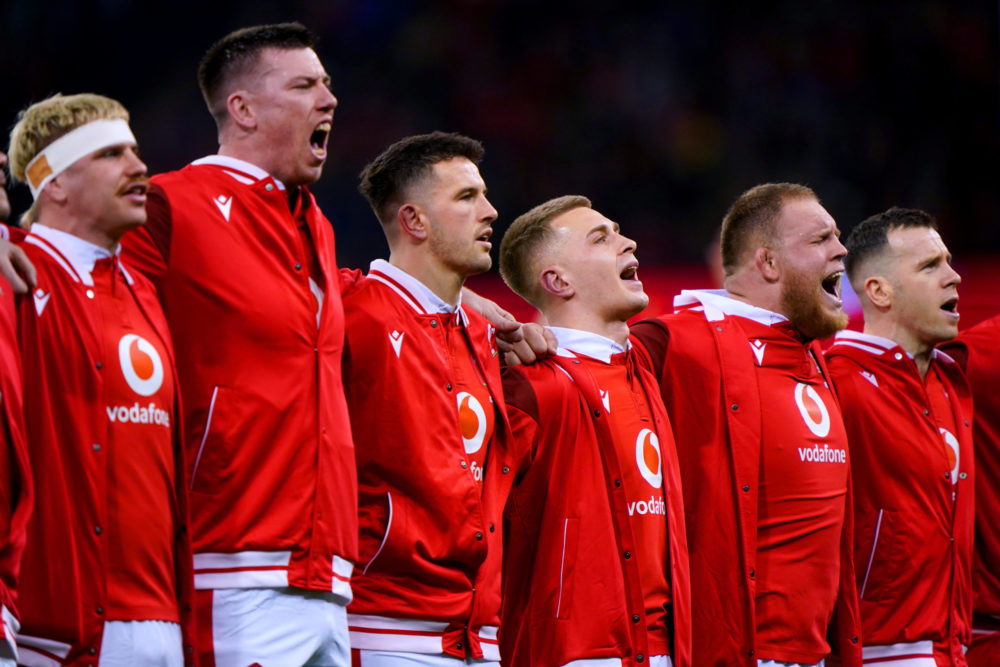What are the implications for rugby and its fans of the Six Nations leaving terrestrial TV?

Richard Thomas, Professor of Journalism, Swansea University
Iwan Williams, Senior Lecturer in Media, Swansea University
The Six Nations Championship always serves plenty to excite stadium and television audiences. But the high-octane drama risks being overshadowed by off-field events that could also threaten the principles of public service broadcasting.
As a televisual event, rugby is thriving. Viewing figures for the Rugby World Cup in 2023 were 19% higher than the 2019 tournament, and 30% higher than in 2015. Free-to-air Six Nations games regularly draw between 3 and 4.5 million viewers in the UK. Globally, an estimated 121 million people tuned in to the 2023 tournament.
So, it’s surprising that the Six Nations is classified by the UK government’s Department for Culture, Media and Sport as a “category B” tournament. This means it can be sold to anyone, providing that free-to-air broadcasters are given access to highlights or delayed coverage.
Meanwhile, for “category A” events like the FA Cup final and the Olympic and Paralympic Games, full live coverage must be offered by free-to-air terrestrial broadcasters. Recently, a bid to move the Six Nations into category A was rejected by the UK government.
The BBC and ITV have had the rights for the Six Nations since 2003, but that could change. Rugby’s governing bodies need more money, and free-to-air channels are feeling the financial pinch. On top of that, more and more people are opting for streaming services in general. So, when the current broadcasting deal ends in 2025, the Six Nations could very well end up behind a paywall.
Financial woes
Money – or the lack of it – is the important factor here and Welsh rugby especially is experiencing the effects more than most. It faces a stark future both on and off the field, with players leaving Wales for more money and salary caps being introduced for those who stay.
While there’s a consensus in the Senedd for the Six Nations to remain free-to-air, the Welsh Rugby Union (WRU) has warned it would “struggle to survive” without a competitive bidding scenario involving Sky, Amazon Prime and others.
Some Scottish politicians concur with the Senedd, adding a further constitutional dimension. The SNP’s Gavin Newlands recently reiterated calls for broadcasting to be devolved so that the Six Nations remains free-to-air.
There are precedents for rugby moving to a subscription service too. The 2023 Autumn Internationals were only accessible on Amazon Prime, and between 1997 and 2002, England’s home games were shown exclusively on Sky Sports.
But that raises concerns about affordability, especially for those fans already finding attending matches too expensive. For stay-at-home supporters, even the “home comfort” option of watching on TV might become too costly.
According to former BBC executive and now WRU executive director of rugby, Nigel Walker, this “tension and competition at the market” is essential for rugby’s survival. The Irish Rugby Union has also previously warned about the “substantial financial damage” to rugby if the Six Nations was classified as free-to-air.
Lessons from cricket
Free market proponents point, for example, to how Sky’s long-lasting commitment to cricket has led to innovation and technical advances such as multiple cameras and data-rich, TV-friendly statistical analysis. It results in a quality of coverage that the BBC or ITV might struggle to match with more meagre budgets.
But test cricket offers a cautionary tale. It found a surge of new fans during Channel 4’s captivating coverage of the epic 2005 Ashes, with the final day of the fourth test drawing 8.4 million viewers. When Sky secured the rights a year later, this fresh audience vanished.
The 2023 Ashes saw peak viewing figures of just 2.12 million. Having hauled in millions of new enthusiasts, cricket failed to keep them watching.
If rugby does succumb to the paywall, there are serious implications. Perhaps as an inevitable consequence of a captive audience, subscription prices might increase as “market forces” prevail.
And if televised rugby lit a fire in the belly of an emerging generation of players, there’s a chance a paywall could just as easily extinguish it. This is especially relevant in Wales, where 51% of the population stated that they had an interest in the tournament, versus only 26% in England.

For Wales, where rugby players are often revered as heroes, the cultural implications are also considerable. The players are role models who help cement a common sense of nationhood and cultural identity. Will their power to inspire future generations fade if fans can’t afford to watch them? Possibly not, but making rugby less accessible may stifle the enthusiasm of emerging talent.
And there is a further conundrum regarding the very nature of public service broadcasting. According to legislation, one principle of broadcasting in the public interest is that it should “satisfy a wide range of different sporting and other leisure interests”.
For many, public service broadcasting principles might seem a dispensable fragment of an increasingly complex jigsaw, but they should not be dismissed lightly. The protective standards and quality they provide, and the inclusivity they ensure, were not necessarily conceived with rugby in mind. But losing them to the pursuit of bigger paydays would be a significant blow to the cultural and social fabric that sport weaves within society.
This article was first published on The Conversation
![]()
Support our Nation today
For the price of a cup of coffee a month you can help us create an independent, not-for-profit, national news service for the people of Wales, by the people of Wales.







Westminster as ever ignorant to things this side of the border. I wonder how willing Sky would be to provide Welsh language commentary? If there was ever a case for devolving broadcasting, this is it.
Sky used to offer a red button service for Welsh language commentary for the football internationals. But I agree broadcasting should be devolved.
I know I’m just one individual but if the 6 Nations went behind a paywall I would have no need for a television and would cancel my TV licence. I certainly would not have sky TV or any of the streaming services.
It will become a game played behind closed doors, for money not enjoyment. Much like Premier League Soccer.Watch Llanelli V The All Blacks 1972. Passion and community@
You wont get me back through the doors to the stadium through choice, partly cost, partly food, then the booze and constant toilet breaks. TV is the last bastion for the many that cannot make it for many reasons. I wont pay into the coffers of the usual suspect sports, but I bet the ticket price will not come down if there is an injection of cash into the coffers via pay TV.
The Welsh Rugby team means a great deal to the Welsh people, just like the England football team means a great deal to the people of England. The UK government would never in a million years allow for the FIFA World Cup or European Championship to go behind a paywall. Why can’t the Welsh Government have the power to ensure that the Six Nations and Rugby World Cup are protected in Wales?